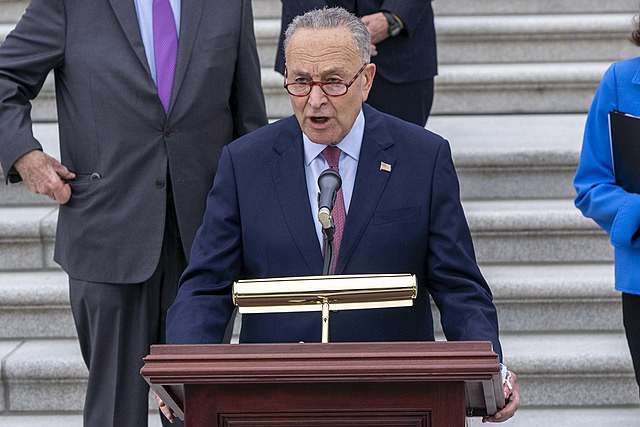The Senate voted 75-22 on Friday evening to pass a $467.5 billion spending package, narrowly avoiding a partial government shutdown just hours before the midnight deadline. The bipartisan deal, which funds critical government programs through September, now heads to President Joe Biden's desk for his signature.
The House of Representatives had already approved the legislation on Wednesday with a resounding 339-85 vote, showcasing the broad support for the compromise package. "Tonight, the Senate has reached an agreement avoiding a shutdown on the first six funding bills," Senate Majority Leader Chuck Schumer announced on X, formerly known as Twitter. "We will keep important programs funded for moms and kids, for veterans, for the environment, for housing, and so much more."
The appropriations package provides funding for the departments of Agriculture, Commerce, Justice, Energy, Interior, Veterans Affairs, Transportation, Housing and Urban Development, as well as the Food and Drug Administration, military construction, and other federal programs. The legislation represents a significant breakthrough after months of intense negotiations and last-minute stopgap measures to prevent shutdowns.
Both Democrats and Republicans have claimed victories in the spending package. Democrats highlighted the bill's support for critical social safety net programs, such as the $7 billion allocated to the WIC program, which provides nutrition assistance for women, infants, and children-a $1 billion increase from the previous fiscal year. The package also includes funding for rental assistance and child nutrition programs, including the school lunch program.
Republicans, meanwhile, touted spending cuts and conservative policy riders included in the legislation. House Speaker Mike Johnson stated, "This legislation forbids the Department of Justice from targeting parents exercising their right to free speech before school boards, while it blocks the Biden Administration from stripping Second Amendment rights from veterans. It imposes deep cuts to the EPA, ATF and FBI, which under the Biden Administration have threatened our freedoms and our economy, while it fully funds veterans' health care."
However, the hardline House Freedom Caucus opposed the spending package, arguing that it "punts on nearly every single Republican policy priority" and "surrenders Republicans' leverage to force radical Democrats to the table to truly secure the southern border."
Despite this opposition, the Senate managed to pass the bill without any amendments, ensuring its swift passage to the President's desk. The successful passage of the spending package marks a significant step towards stable government funding and a reprieve from the constant threat of shutdowns.
Looking ahead, Congress now has two weeks to address the remaining six funding bills, which are set to expire on March 22. These bills are expected to prove more challenging to pass, as no compromise legislation has yet been reached, and none of the bills in this tranche have been considered on the Senate floor.
As lawmakers continue to work towards a resolution, the passage of the $467.5 billion spending package serves as a testament to the power of bipartisan cooperation in the face of impending deadlines. The American people can rest assured that, for now, critical government programs and services will continue uninterrupted.






